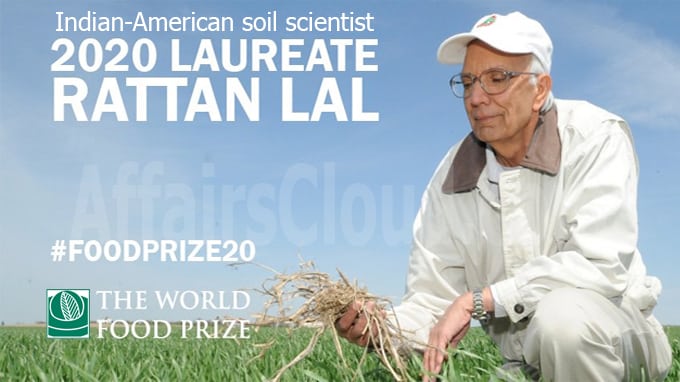 On 11th June 2020, 76-year-old Indian-American Soil scientist, Dr. Rattan Lal received the 2020 World Food Prize Laureate (250,000 USD – Rs. 1.89 crore) for developing and mainstreaming a soil centric approach to increase food production that conserves natural resources and mitigates climate change. He was born in 1944 in Karyal, West Punjab, India.
On 11th June 2020, 76-year-old Indian-American Soil scientist, Dr. Rattan Lal received the 2020 World Food Prize Laureate (250,000 USD – Rs. 1.89 crore) for developing and mainstreaming a soil centric approach to increase food production that conserves natural resources and mitigates climate change. He was born in 1944 in Karyal, West Punjab, India.
Note-World Food Prize is also referred as ‘Nobel Prize in the field of agriculture’ or “Nobel Prize for Food and Agriculture.”
World Food Prize:
i.This award was issued from the World Food Prize Foundation in the Digital Dialogue with Gebisa Ejeta, chair of World Food Prize Laureate Selection Committee.
ii.It is awarded for specific, significant achievement of an individual that advances human development with an increased quality, quantity, availability or access to food through innovative interventions within the scope of the food system.
Note:
Dr. M S Swaminathan, Indian Agricultural scientist received the first World Food Prize in 1987.
About Dr. Rattan Lal:
i.Dr. Lal is an alumnus of Ohio State University(OSU) and he began his research career at the International Institute of Tropical Agriculture (IITA) in Nigeria.
ii.Dr. Lal is a professor in the College of Food, Agriculture and Environment Sciences(CFAES) at OSU and founding Director of the Carbon Management and Sequestration Centre established in 2000 at CFAES, Ohio.
iii.Three separate Climate Change conferences of the United Nations adopted his strategy of restoring soil health to sequestering carbon
Awards:
i.He received the Norman Borlaug Award in 2005 presented by Dr. Borlaug and the Liebig Award in 2006.
ii.In 2007 IPCC was named co-recipient of Nobel Prize and He was recognised with the Nobel Peace Prize certificate for his contribution to the Intergovernmental Panel on Climate Change(IPCC) reports.
iii.He received the Swaminathan Award in 2009 and the Glinka World Soil Prize and the GCHERA World Agriculture Prize in 2018.
Soil Centric Approach:
i.Dr. Lal’s research demonstrates the importance of Soil as a crucial component in sustainable agriculture intensification to increase the crop yield.
ii.The solid centric approach is based on “the health of the soil, plants, animals, people and the environment is one and indivisible” which benefits 500 million small farmers through improved management, reduced soil degradation and recycling nutrients and saves hectares of natural tropical ecosystems.
iii.His model indicates that soil health restoration will multiply the benefits by the year 2100 by doubling the global grain yield while decreasing the requirement of land by 30% and fertilizers by 50%
About World Food Prize Foundation:
President– Barbara Stinson
Headquarters– Des Moines, Lowa, United States of America




